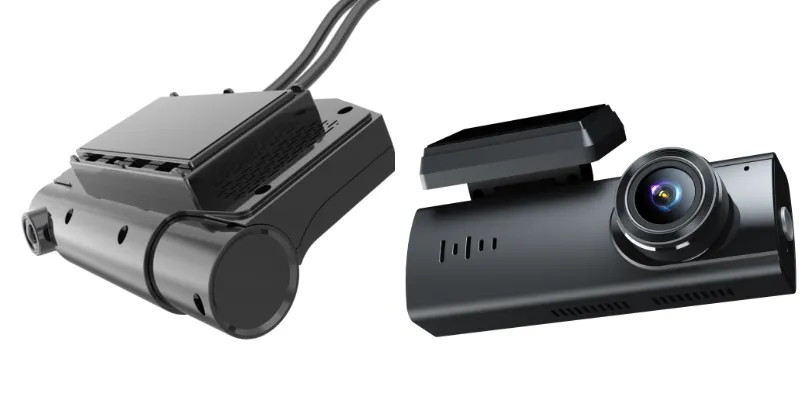Pune’s Safe Cams is ensuring road safety via its Made in India dash cameras
Started in 2019, Pune-based Safe Cams is one of the first MSME to make dash cameras in India. From bagging government projects to supplying to Kuwait Oil Company, here is how Safe Cams is building in India.
In 2022 alone—the latest year for which such data is available—India saw over 4.6 lakh road accidents, with more than 1.6 lakh people losing their lives, according to the Ministry of Road Transport and Highways.
In a country where most drivers routinely ignore traffic rules, dashboard cameras or dash cams can provide a safety net—both legal and financial—in case of accidents.
While only 1% of Indian vehicles currently have these devices, Vanesh Naidoo, Founder and Director at Safe Cams Digital Eye–one of India’s first MSME manufacturers of dash cameras–believes the country presents a huge opportunity.
“When I returned from London in 2018, I was looking for business opportunities. Having driven in most parts of the world, I know how safety and security while driving is of paramount concern but in India that was badly lacking. And while I was looking for a dash cam for my own vehicle, I saw a big opportunity for the same in this market,” Naidoo tells SMBStory.
Dash cameras serve as a dependable safety measure, functioning not only as a "CCTV for a car" to reduce accidents but also as a critical tool in the event of an incident or mishap, the founder says. The company also provides video evidence in the court of law, enhancing its security and accountability.
Naidoo and his wife Chetna founded in 2019, and have since grown the business via B2B collaborations for smart city projects, and partnerships with police departments.
Safe Cams reported a revenue of Rs 28 lakh in FY23. According to Naidoo, the company will cross Rs 1 crore mark in this calendar year
Growing pains
Safe Cams has had to deal with several challenges from the get-go: the COVID-19 pandemic struck a year after its inception, which led to near-zero revenue for two years.
“The business picked up in 2022 and we started with a smart city project in Kalyan-Dombivali Municipal Corporation (KDMC) and since then we are in an upward journey moving gradually,” Naidoo says.
Onboarding customers has also been a hurdle, the founder says.
“At first, the need is to make people understand that dash cam isn’t a luxury but a necessity. Often, when individuals contemplate purchasing a car, there's a prevailing mindset that opting for a feature-rich vehicle with dash cams or other security features might be costly. However, it's essential to recognise that such features are necessary to prevent road mishaps. So, the market is big, but there’s a need to create awareness,” Naidoo tells SMBStory.

Safe Cams' product range
Safe Cams has partnered with car accessory dealers primarily in Pune and is soon planning to expand to other metro cities.
There are other players in the dash camera industry like Qubo, Nexdigitron, however, Naidoo says that being an MSME plus having an in-house production unit sets Safe Cams apart from its peers.
An Indian dash cam brand
Safe Cams is one of the first Indian dash cam brand that is an MSME, Naidoo says, adding that in 2021, the company received BIS and EPRA (government e-waste scheme to ensure the recycling of e-waste) certifications. The company is also a ZED (Zero Defect Zero Effect—an industry standard that means the products have zero defects and zero negative effects on the environment) certified MSME manufacturer.
Safe Cams dash cameras start from Rs 3,599 and go up to Rs 13,000 for private vehicle owners. The brand also offers cameras to fleet owners whose price range goes up to Rs 30,000 to Rs 40,000 per unit.
While the company imports a majority of its raw materials from China, Taiwan, Japan, and South Korea, Naidoo says that the Indian ecosystem is building up; however, materials like RCB (residual current breaker—an electrical wiring device that protects against electrocution) boards are expensive to source locally.
Emerging technology, especially AI, lies at the heart of Safe Cams, the founder says. According to Naidoo, its AI-based DSM range (Driver Status Monitor) cameras provide driver identification, tampering alarm or obstruction as well as track driver fatigue.
The way forward
In 2023, Safe Cams fulfilled an order from Kuwait Oil Company.
“Currently, we stand as one of the two companies with our device approved by KOC for their fleet. In the initial phase, we have successfully integrated approximately 270 cameras. KOC is actively monitoring these cameras and providing monthly reports. Recently, they have opted to develop their own cloud platform, where all approved devices will connect and directly share alarm information with KOC,” the founder explains.
“The construction of this platform is now underway. We have submitted our communication protocols to KOC to ensure seamless sharing of alarms and video footage with their central server. Once the platform is established, we will progress to the second phase of the project, involving the installation of 2000 DSM units,” he adds.
From supplying dash cams to Mumbai Thane police, Chhattisgarh, 7th Rifles J&K, and University of Delhi to being an OEM for Amazon India’s private label brand, and entering the retail market, Naidoo says Safe Cams has come a long way. However, the founder adds that retail penetration will take time, as the Indian market is currently not open to dash cams.
“You can take it as a CCTV boom that happened in the 2000s, the way CCTVs took off, dash cameras also have a similar future,” Naidoo says.
Edited by Affirunisa Kankudti







